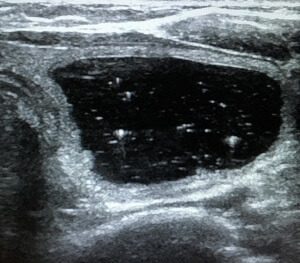Thyroid Ultrasound Cost
Last Updated on December 29, 2023
Written by CPA Alec Pow | Content Reviewed by ![]() CFA Alexander Popinker
CFA Alexander Popinker
Ultrasound of the thyroid gland is the first imaging method in the exploration of the thyroid gland and is considered the most sensitive method to investigate it. Imaging exploration through which the thyroid gland is visualized is an investigation that allows the evaluation of the size, structure, vascularity of the thyroid, and the identification of possible cysts or thyroid nodules. Although not a routine investigation, thyroid ultrasound should be performed when there is a suspicion of a diagnosis following a clinical history and physical examination.
How much does a thyroid ultrasound cost?
The price of a thyroid ultrasound will be greatly influenced by some factors such as your health insurance policy, the place where the ultrasound is performed, whether it is a hospital or a private clinic, the type of ultrasound, and the geographical location. For example, the price of a Doppler or 3D ultrasound will be higher compared to a basic ultrasound because of the higher level of detail and the use of advanced technology.
In case you don’t have health insurance and the ultrasound is performed in a hospital, you will have to pay anywhere between $350 and $1,100 if not more. Though, from what we researched the average cost of a thyroid ultrasound is anywhere between $350 and $650, without including the doctor’s examination fee. These estimates are available only for the ultrasound procedure and will not include the costs of any future treatment options.
According to the Healthcare Bluebook, the cost of a thyroid ultrasound starts at around $230 and goes up to $690.
Preparation for thyroid ultrasound
No special preparation is required for a thyroid ultrasound. The patient can eat, drink and take medication normally both before and after.
You might also like our articles about the cost of pelvic ultrasounds, 3D and 4D ultrasounds, and ultrasound technician classes.
It is helpful for the patient not to wear jewelry around the neck, or to remove it during the thyroid ultrasound so that the doctor can easily maneuver the ultrasound probe over the entire surface of the neck.
How is a thyroid ultrasound performed?
The patient should undress so as to give the doctor access to the neck and décollteé, then lie on his back. A transducer will be used by the doctor on the patient’s skin using a special water-based gel, which helps the ultrasound to be better transmitted through the skin. The transducer is connected through a wire to a device that processes ultrasounds and displays images on a screen.
The ultrasound pulses are sent using the transducer through the skin to the deep structures, then return as echoes and are recorded by the ultrasound machine in real-time, so that the images add up and show not only the structure but also the movement of the analyzed components. The doctor walks the transducer around the patient’s neck to get clearer pictures.
How long does a thyroid ultrasound procedure take?
 The investigation may take between 15 and 30 minutes, depending on the clarity of the image and the number of special measurements required. If there are changes at this level, such as nodules, cysts, or hypertrophy, it is very important that the endocrinologist carefully assesses all the features of the discovered lesion, even if in this way the endocrinological consultation can be extended.
The investigation may take between 15 and 30 minutes, depending on the clarity of the image and the number of special measurements required. If there are changes at this level, such as nodules, cysts, or hypertrophy, it is very important that the endocrinologist carefully assesses all the features of the discovered lesion, even if in this way the endocrinological consultation can be extended.
In this way, the ultrasound report will include a description as accurate and detailed as possible, on the basis of which a more effective therapeutic plan can be formed later in terms of the needs of each patient.
When to do a thyroid ultrasound?
✓ If you have an enlarged thyroid or thyroid nodule.
✓ If there is a high risk of developing thyroid cancer.
✓ If there are symptoms such as dizziness, weight loss or weight gain, swelling of the throat, sudden change in energy levels, hair loss.
Risks and contraindications for thyroid ultrasound
The examination does not present any risks or contraindications. Thyroid ultrasound can also be performed on children and pregnant women, as it is performed with ultrasound and not with ionizing radiation.
How can I save money?
In case you don’t have health insurance or your coverage is limited, you may be able to save some money if you pay the entire bill at once. There are many facilities that offer cash discounts to their patients.
Another way to save money is by asking for price quotes from multiple facilities specialized in ultrasound procedures and comparing the costs. Most of them will be able to offer you a quote over the phone or email as long as you know exactly what type of ultrasound you need.
Conclusion
The ultrasound of the thyroid gland is an essential paraclinical examination in the diagnosis of thyroid diseases, being considered, in the concept of modern medicine, indispensable in the investigation of the thyroid. The identification of thyroid problems as soon as possible is facilitated by ultrasound, which shows very clearly and easily if there are changes in the structure of the gland (nodules, cysts, inflammation, hypertrophy), thus proving its importance in examining the thyroid.


In France the same échographie costs 35 Euros, which the state health system pays 25 and your private insurance (or mutuel) pays the rest. US doctors and clinics are stealing from you